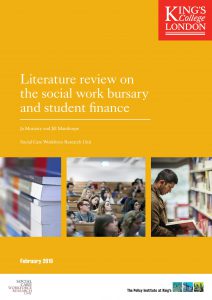
Dr Mary Baginsky
Mary Baginsky is Visiting Senior Research Fellow at the Social Care Workforce Research Unit at King’s College London. Here she suggests how universities and social work services could be brought into closer partnership.
Both Martin Narey’s and David Croisdale-Appleby’s reviews of social work education have reported on the shortage of placements for social work students, as well as raising questions about consistency in the quality of those that do exist. The President of the Association of the Directors of Children’s Services (ADCS), Andrew Webb, has also said that there is neither the range nor breadth of placements to keep pace with student numbers. Martin Narey went so far as to say that the endorsement process should include an evaluation of the quality of practice placements and recommended that universities which fail to provide every student with at least one statutory placement (or an alternative which is genuinely comparable and accepted by employers as comparable) should not receive endorsement from The College of Social Work. There is, perhaps, an alternative approach whereby the placements a student has completed on their registration are recorded. Anyone who had not completed a statutory placement in the relevant sector would then be required to do one subsequently if they wished to be employed in a statutory setting. The cost effectiveness of this would need to be calculated.
However, making this and similar suggestions does not get away from the seriousness of the situation facing courses and students, but neither is it confined to social work students. The Nursing Times (12 February 2014) reported that student nurses are struggling to get good practice placements because hospital wards are overstretched and staff too busy to supervise them.
It is not surprising that the pressures under which children’s service departments are operating and the number being judged to be inadequate by Ofsted are having an effect on the willingness of managers and practitioners to take students on placements. I am well aware of good practice around the country where universities and local authorities have established strong working relationships. They are usually distinguished by a commitment of the university and/or the local authority to take on responsibility for placements at a relatively senior level. This is usually linked with a commitment on the part of local authorities to embed placements in their workforce strategies and on the part of universities to provide a high level of support, not only to students but also to authorities. As training budgets are slashed and more authorities struggle to retain experienced staff such support from universities is an important factor in being placement-possible if not placement-friendly. In the past some authorities have complained that they have had to take what (and whom) universities have offered but the world has moved on. It is in the interests of both parties to collaborate over the training of existing and future practitioners and this is the conclusion that more authorities and universities are reaching.
Thirty-five years ago Hayward (1979) wrote that:
The assessment of practice aspects of the course has traditionally been regarded as different in quality and far more problematic than the assessment of coursework. (p.175)
Assessment of student practice is still the issue that is commonly cited by practice educators and university tutors as the one that is most likely to lead to disagreement, whether this is in terms of practice educators’ concerns about aspects of the student’s practice or perceived generosity or leniency of one party. On a recent visit to Canada I encountered two initiatives that could be introduced in this country and which have brought universities and social work services into closer partnership.
First, there are many examples in the literature that illustrate how individuals come to quite different outcomes when making an assessment and there are also many examples in the literature of attempts to devise competency-based checklists. One of the most reliable is the Objective Structured Clinical Examination (OSCE). The OSCE is used as an assessment tool for licensing exams in nursing, medicine, midwifery and other subjects in the UK, Australia, Canada and the United States. It is used to assess knowledge, clinical skills, and the transfer of knowledge into practice while providing a standardised assessment method irrespective of variations in client or assessor. Marion Bogo, Professor of Social Work at the University of Toronto, has developed an OSCE for social work which is now being used and adapted across Canada and USA. It consists of ‘laboratory’ interviews and structured reflective exercises to see how the student has integrated concepts. OSCE performance and reflections are rated on standardised scales. Initial tests and subsequent applications have shown that the test is a valid tool for assessing practice, even though further development is required. It is being adopted in a number of countries and the question arises as to why it is not as prominent in this country. It is time and labour intensive which, in the current climate, is likely to prove a disincentive. But it is hard to remember a time when this would not have been the case. As well as a potentially more reliable way of assessing students it also offers the opportunity for universities and practitioners to work together on its development.
The second suggestion comes from a visit to McGill University in Montreal. Anyone taking a student on placement who is attending McGill is required to take a course on supervision before the placement. Not only is this a way of attempting to ensure the quality of placements, it means practice educators engage with McGill at an early stage and the university then builds on this relationship in a number of ways. One way is by inviting their practice educators to regular meetings with the faculty members of the Social Work department. I was fortunate to be able to attend one of these meetings and I was struck both by the understanding of the course that the practice educators displayed and by the breadth and depth of the discussion. So while administrative and progress issues around the actual placements were covered, there was much more discussion of issues around the integration of theory and practice and of specific elements of the training. It was evident that there was a shared understanding of the curriculum, which must in turn benefit all involved but most of all the students on placement. It represented a real partnership of practice and academy that is often talked of but not often achieved in England. It is a model that would transfer to this country but again one that demands a significant level of commitment.
It may not seem the most sensible approach to suggest initiatives that will take even more time and application. But it seems that while social work courses have been forced to address the criticisms leveled against some academic input for its lack of rigour and consistency, similar standards need to be applied to placements and ones that go beyond the revised Practice Educator Professional Standards, however welcome these have been. Practice and professional trainers need to address this subject together. They will find many ways of doing so but perhaps these two examples could be in the portfolio of actions they consider.
Dr Mary Baginsky is Visiting Senior Research Fellow at the Social Care Workforce Research Unit, King’s College London. Follow Mary on Twitter: @abbotsky
Reference:
Hayward, C. (1979) A Fair Assessment: Issues in Evaluating Coursework. London: CCETSW.
 Carolin Hess
Carolin Hess 



